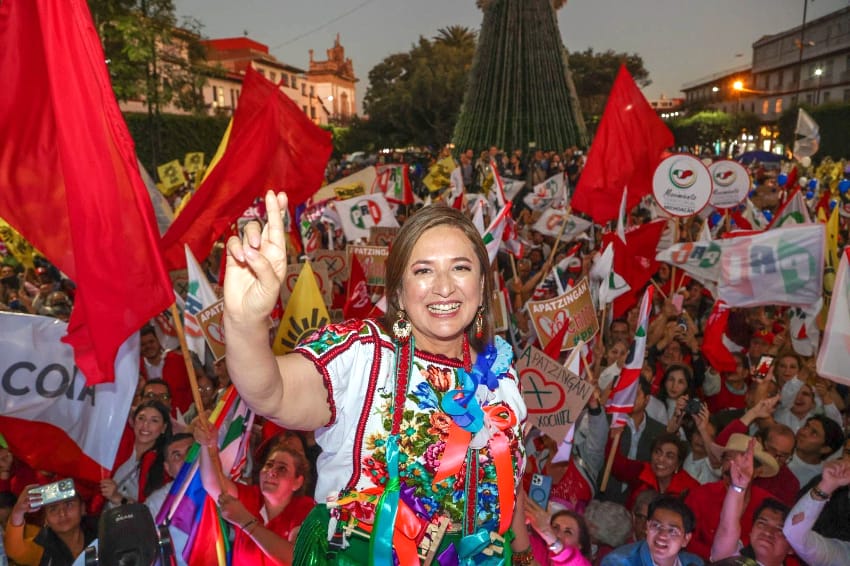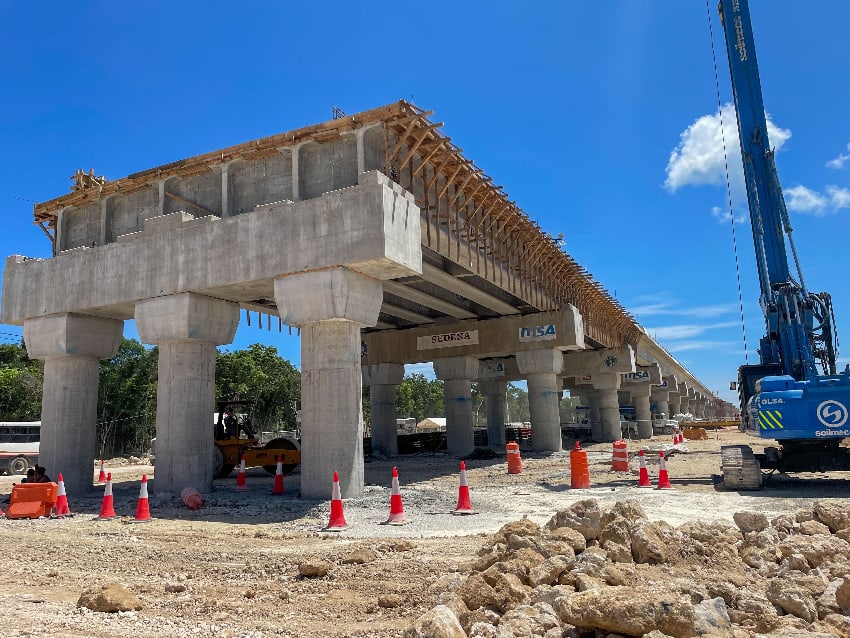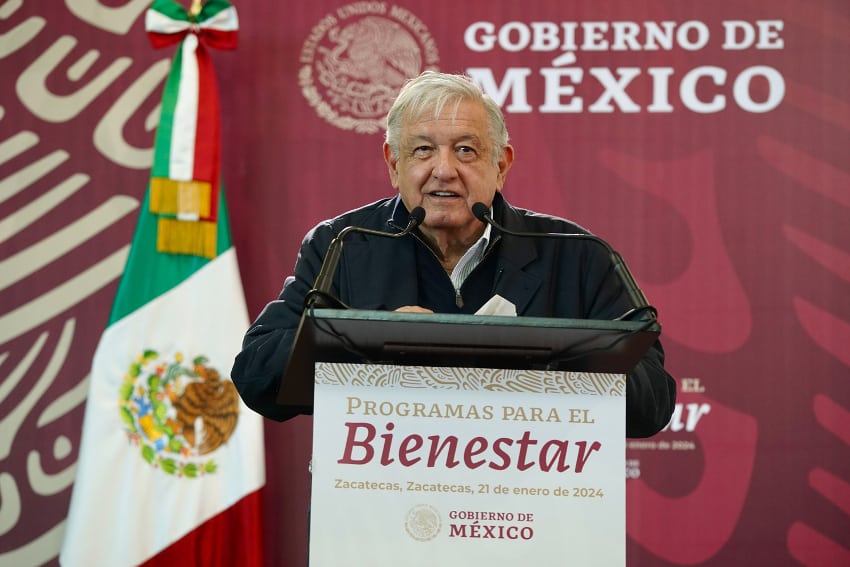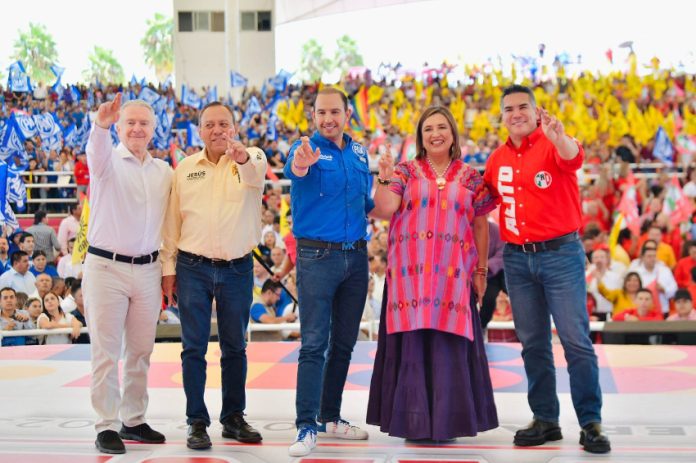Reforming Pemex and the Federal Attorney General’s Office and reviving the international trade and investment agency ProMéxico are among the initiatives a government led by opposition presidential candidate Xóchitl Gálvez would undertake, according to a draft plan obtained by the El Universal newspaper.
Gálvez, a federal senator currently on leave to campaign for the presidency, will represent an alliance made up of the National Action Party (PAN), the Institutional Revolutionary Party (PRI) and the Democratic Revolution Party (PRD) at the June 2 election.

Poll results show that Claudia Sheinbaum, the candidate for an alliance led by the ruling Morena party, is the clear favorite to become Mexico’s next president. The third candidate in the race, Jorge Álvarez Máynez, who represents the Citizens Movement (MC) party, is today polling well behind both Sheinbaum and Gálvez.
While an opposition victory currently appears unlikely, the document “Electoral Platform of the Strength and Heart for Mexico Coalition” offers an insight into the objectives a government led by Gálvez might pursue should she prevail on June 2.
In a report published on Thursday, El Universal said that the document was developed by PAN, PRI and PRD leaders with the participation of eminent figures such as José Ángel Gurría, a former cabinet minister and secretary general of the OECD. The draft plan is subject to approval by the opposition alliance’s council, the newspaper noted.
What’s in the plan?

El Universal provided an overview of the contents of the document, but details on Strength and Heart for Mexico’s proposals were scant.
Among the proposals are to:
“Completely reform” Pemex, the heavily indebted state oil company, and the Federal Attorney General’s Office (FGR)
With regard to the FGR, the aim is to “guarantee that it is authentically independent” of government, according to the document. The current government, which carried out its own reform of the Attorney General’s Office, asserts that is already the case.
Reestablish ProMéxico, which was disbanded by the current government
The trade and investment agency previously had dozens of international offices in globally important cities such as New York, London and Tokyo. Under the previous government, the ProMéxico paid salaries as high as US $21,000 a month to its employees, according to information that came to light in 2019.
Put an end to the military’s involvement in public security
A Gálvez-led government would gradually return members of the armed forces to their barracks, according to the document. Before he took office in late 2018, President Andrés Manuel López Obrador pledged to do exactly that, but like his predecessors, he has used the military to patrol the streets of Mexico and combat organized crime.
In an interview last year, Gálvez said she was opposed to the presence of “the army in the streets.”
Transform the National Guard into a civilian security force

The current government created the National Guard and put it under the full control of the army in late 2022. However, the Supreme Court ruled last year that that move was unconstitutional. López Obrador now wants to change the constitution to once again put the National Guard under army control.
The Strength and Heart for Mexico document says that the National Guard should be a civilian force that is well-funded, respects human rights and whose members are well-trained.
Gálvez has previously said that the federal security minister must be a civilian, rather than a military leader, and the National Guard must be a civilian force.
Review the current government’s infrastructure projects and social programs
According to the draft plan, projects such as the Olmeca oil refinery on the Tabasco coast, the Felipe Ángeles International Airport and the Maya Train railroad were built without an “in-depth assessment” and without adequate environmental impact studies.
Thus, a Gálvez-led government would scrutinize the projects, according to the draft plan.

In addition, it would create a body to audit programs such as the Sowing Life reforestation/employment scheme and the Youths Building the Future apprenticeship initiative.
Consider a universal basic income scheme
According to El Universal, the draft plan “takes up” Ricardo Anaya’s idea of providing citizens with a universal basic income.
Anaya, a former politician and national leader of the PAN, proposed a universal basic income of 1,500 pesos (US $87) per month when he was campaigning for the presidency in 2018.
Other proposals in the draft PAN-PRI-PRD document include to:
- Establish a new “career model” for municipal, state and federal police officers.
- Establish an autonomous body tasked with evaluating security policies.
- Overhaul the prison system.
- Release political prisoners.
- Promote Mexico as a destination for nearshoring and offer additional incentives to private companies.
- Establish bilingual education programs.
- Reestablish the disaster relief fund Fonden, a public trust López Obrador described as “a kind of petty cash box” for corrupt officials.
An overarching objective
According to the draft plan, the Strength and Heart for Mexico alliance aims to establish a coalition government that “combats the threat of client authoritarianism” and “puts an end to [a] centralist presidency.”
López Obrador has been accused of seeking to concentrate government power in the executive branch, especially via his plan to get rid of various autonomous agencies.
In their document, the PAN, the PRI and the PRD asserted that Mexico, under the leadership of the current president, “has been led to a phase of multiple risks” and significant “economic, political and social vulnerability.”
The current government is incapable of providing security, health care, education and prosperity to citizens, the parties said, adding that Mexico is a “divided and polarized” country” whose people are engaged in a “destructive confrontation.”
That situation is caused by a government whose head “acts like the leader of his party” and promotes “disunity among Mexicans,” they said.

Thus, Mexico urgently needs a new government “that guarantees a horizon of opportunities for change, supported by a call for reconciliation in order to achieve unity as a value and a path” ahead for the country, the document said.
López Obrador has denied that Mexico is polarized given that poll results show that he has maintained strong support throughout his presidency.
There is no political polarization in Mexico “because that occurs when societies are divided in two,” he said last October.
“That’s not happening in our country because the majority [of people] support the transformation, not [just] 50%,” López Obrador said.
With reports from El Universal
